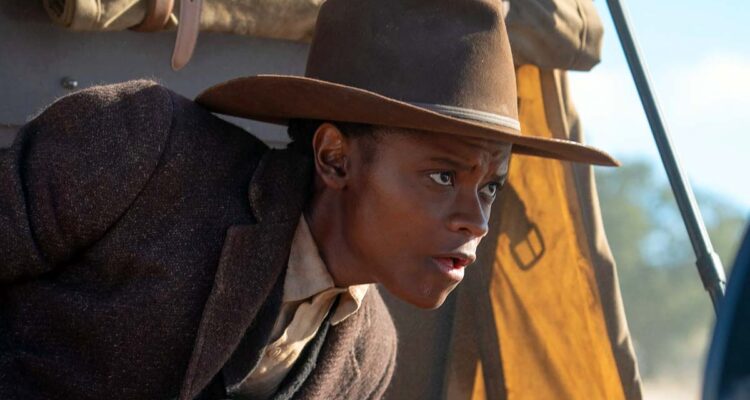Westerns, by nature, usually find themselves set in isolated parts of the United States with a limited cast and set that allows dialogue to do the heavy lifting as much as the characters speaking those lines. With any luck, a talented group of actors will help to elevate both elements to a level beyond what could be considered a stage play with cowboy hats and revolvers. When this feat is achieved, the results can often be excellent, ranging from the legendary Clint Eastwood’s genre-defining “The Good, the Bad, and the Ugly” and “Unforgiven,” as well as more recent entries such as Quentin Tarantino’s “Django Unchained” and “The Hateful Eight.”
READ MORE: The 25 Best Westerns Of All Time
Somewhere in the middle of the graph of quality sits “Surrounded,” the newest addition to the genre, fulfilling the requirements mentioned above to a T, as if someone in the editing room was running through a list as the final cut played out before them; Vast, rural landscapes? Check. Southern accents and exaggerated characters? Check. Gunplay sequences that play out nearly too quickly for the eye to comprehend? A big check and this is just the beginning. You can see some complaints begin to materialize, which is something of a shame, as this film does have some redeeming qualities that sadly can’t help but find themselves buried under an uninspiring desert. Letitia Wright plays Mo Washington, a now-free former slave who, following time spent in the Civil War as a solider, has continued to pose as a man to undertake a journey across the country in order to claim a gold mine; unfortunately, after her stagecoach is robbed and a deadly skirmish ensues, Washington must now escort ringleader Tommy Walsh (Jamie Bell) to justice while the remaining stagecoach survivors head off in search of assistance. What follows is a seemingly endless amount of back-and-forth between the two leads, broken up by the occasional flourish of weaponry, run-ins with both Native American factions as well as Tommy’s gang, and undeniably gorgeous vistas befitting of this type of film; Anthony Mandler, who comes from a background directing music videos before helming 2018’s “Monster,” does what he can, but the end result can’t help but feel staggeringly formulaic.
READ MORE: 13 Essential Female-Led Westerns
It’s a shame, as star/co-producer Wright does an honestly fine job in the lead role, conveying an exciting balance of intensity and vulnerability that commands every scene, especially those she shares with Bell. Though Bell tends to drift into the overused onscreen persona of a scruffy villain, with several over-the-top line deliveries that reek of high school theatre, overall, his performance gets a passing grade and finds itself helped tremendously whenever he and Wright lock horns or open up about their respective backgrounds. Wright, however, earns her gold star repeatedly, with several scenes that possess a nice crescendo up into an explosive fight or gun battle. It’s the sort of storytelling trope Tarantino uses to great effect, and here, with a noticeable lack of score throughout much of the film, this build is only amplified further, never getting old and always propelled by Wright.
Are there any other notable members of the cast, you may ask? Of course, the late Michael K. Williams makes the most of his brief scene as a bounty hunter tracking down Tommy. At the same time, Jeffrey Donovan allows his handlebar mustache to overshadow anything he’s bringing to the table in terms of his character. Brett Gelman‘s also here, still sporting his own signature face full of facial hair, an attempt at a British accent, and mercifully exiting the film before his presence goes from avoidable to somewhat perplexing. There’s also a noticeable lack of humor, which doesn’t help the film’s already downbeat tone.
Is “Surrounded” worth a watch? Possibly, if for no other reason than to witness a pair of actors working well off each other or to gaze upon some beautiful photography; everything else is as average as any other forgotten Western of the past century and tends to tip the scale in favor of Pass On This One as soon as Ben Harper’s end credits song begins to play. It’s not a bad movie by any means, but in its attempts to plant a seed audiences may remember in years to come, it’s a misfire. [C-]

